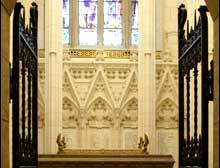
|
|

|
|

|
|||||||||
 |
CANADIAN PARLIAMENTARIANS ABROAD International Activities
On
the World Stage
|

|
PHOTO: © HOUSE OF COMMONS |
Other notable visitors during the year included: the President of the Senate of the Republic of Poland (October 2004); the Speaker of the National Assembly of the Republic of Botswana (October 2004); the Speaker of the National Council of the Swiss Confederation (November 2004); the President of the Riigikogu of the Republic of Estonia (February 2005); and the Speaker of the National Assembly of the Republic of Benin (March 2005).

|
PHOTO: © HOUSE OF COMMONS |
Canadian
Parliamentarians Abroad
Canada's House of Commons is renowned for its
leadership in many areas -from procedural services to
business management, security and technology. The House
of Commons shares its knowledge and promotes features
of Canada's parliamentary system with other
legislatures, including those of emerging democracies.
The Speaker, Members and administrative personnel are
often invited to share Canada's methods and practices,
and exchange ideas, values, knowledge and experience
with other parliaments. During the period of this
report, Members participated in a variety of meetings
abroad, in countries as diverse as Scotland and
Singapore. Reports generated as a result of these
visits are available under "Interparliamentary Affairs"
on the
Parliament of Canada Web site.
Conferences
The Parliament of Canada regularly hosts international
parliamentary conferences. During the 2004-2005 fiscal
year, Canada hosted the
50th Commonwealth Parliamentary Conference in
Ottawa, Quebec City and Toronto. From August 29 to
September 9, more than 600 delegates attended the
conference at the invitation of Speaker Milliken, in
his capacity as President of the Commonwealth
Parliamentary Association, and his counterparts in the
Senate and in the provincial and territorial
legislatures. Promoting knowledge and understanding of
the constitutional, legislative, economic, social and
cultural systems within a parliamentary democratic
framework, the theme of the conference was
Responsibilities and Rights of People and
Parliaments in a Global Community.
Going Online
A new International
and Interparliamentary Affairs section was added to
the Parliament of Canada Web site in February 2005,
highlighting the activities undertaken by
parliamentarians in parliamentary associations,
parliamentary conferences, parliamentary exchanges and
protocol events. The site, which presents a complete
calendar of international and interparliamentary
activities, provides readily accessible information to
Canadians about parliamentarians' international work.


|
|
A solemn space that inspires a sense of peace and respect, the Memorial Chamber situated in the Peace Tower of Canada's Parliament buildings is a noble tribute to those who gave their lives during the Great War in France and Flanders. It was constructed between 1923 and 1927 using stone donated by the governments of Great Britain, France and Belgium. The Memorial Chamber is noted for its detailed Gothic Revival style -the small space has a lofty appearance due to the exceptional height of its walls and the delicate tracery of its carving. The focal point of the Chamber is an altar containing the Book of Remembrance that holds the names of over 66,000 Canadians who died during the First World War. Today, five additional Books of Remembrance Commemorate Canadians who have given their lives in other conflicts around the world. |
|
![]()
![]()
A Joint Address to Parliament is a speech made by a distinguished visitor -usually a foreign head of state or head of government- to Members of the Senate and the House of Commons. The regular proceedings of the House of Commons are suspended for the occasion.
![]()
The Parliament of Canada belongs to a dozen associations through which it promotes the country's interests abroad and engages in multilateral and bilateral activities. These associations include members of both the Senate and of the House of Commons.
![]()
Canada's Parliament maintains four official interparliamentary groups: Canada-Germany, Canada-Israel, Canada-Italy, and Canada-Ireland. This last group received official recognition in 2004. These groups strengthen relations between Canadian parliamentarians and those in the countries concerned. Their activities are supported with membership fees contributed by individual parliamentarians.
![]()
Parliamentary
exchanges play an important role in Canada's
international parliamentary diplomacy by enhancing ties
with other countries and facilitating the exchange of
ideas, values, knowledge and experience. They include:
official visits to Canada by Speaker-led foreign
delegations; official visits abroad by Canadian
parliamentarians headed by the Speaker of the House of
Commons; and the
Parliamentary Officers' Study Program, which allows
senior parliamentary staff from abroad and Canadian
provincial and territorial officials to learn about the
Parliament of Canada.